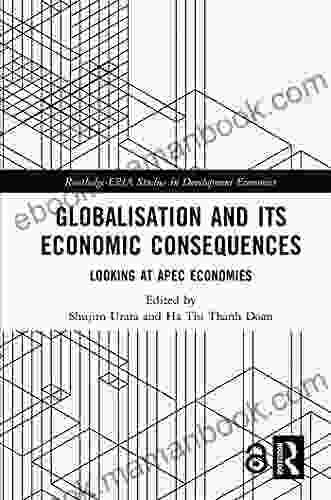Globalisation and Its Economic Consequences

Globalisation has emerged as a defining force in the 21st century, shaping economic landscapes and impacting businesses, workers, and consumers worldwide. It refers to the increasing interconnectedness and interdependence of countries and peoples, facilitated by advancements in transportation, communication, and technology. This process has accelerated the flow of goods, services, capital, and ideas across borders, creating a globalised marketplace and transforming the way we live and work.
The economic consequences of globalisation are multifaceted and complex, with both positive and negative implications. This article aims to provide a comprehensive analysis of the economic consequences of globalisation, exploring its key drivers, opportunities, and challenges.
4 out of 5
| Language | : | English |
| File size | : | 9197 KB |
| Text-to-Speech | : | Enabled |
| Screen Reader | : | Supported |
| Enhanced typesetting | : | Enabled |
| Word Wise | : | Enabled |
| Print length | : | 248 pages |
Drivers of Globalisation
Several key factors have contributed to the rise of globalisation, including:
- Advances in transportation and communication: Technological advancements in shipping, aviation, and telecommunications have made it easier and faster to transport goods and services across borders, facilitating global trade and connectivity.
- Trade liberalisation: The removal of trade barriers, such as tariffs and quotas, has promoted international trade and investment, creating a more open and interconnected global economy.
- Foreign direct investment (FDI): The increased movement of capital and investment across borders has fostered the growth of multinational corporations and global supply chains.
- Technological advancements: The development of the internet and digital technologies has accelerated the globalisation process, enabling the exchange of information, ideas, and goods and services on a global scale.
Economic Consequences of Globalisation
Positive Consequences
Globalisation has brought about numerous economic benefits, including:
- Economic growth: By expanding markets and increasing the efficiency of production, globalisation has contributed to economic growth in many countries, particularly developing economies.
- Lower consumer prices: Increased global competition has led to lower prices for consumers, as businesses seek to reduce costs and compete in a global market.
- Increased choice and variety: Globalisation has expanded the range of goods and services available to consumers, providing greater choice and variety.
- Job creation: While some jobs may be displaced by globalisation, it can also create new jobs in export-oriented industries and services sectors.
- Cultural exchange: Globalisation has fostered cultural exchange and understanding, as people from different countries interact and share ideas and experiences.
Negative Consequences
Alongside its benefits, globalisation has also raised concerns about its potential negative consequences, such as:
- Income inequality: Globalisation can exacerbate income inequality both within and between countries, as businesses relocate to lower-wage countries and workers in developed economies face competition from lower-cost foreign labour.
- Job displacement: The movement of production to countries with lower labour costs can lead to job losses in industries that are more exposed to global competition.
- Environmental degradation: The increased production and consumption associated with globalisation can put a strain on natural resources and contribute to environmental degradation.
- Loss of cultural identity: Globalisation can lead to a homogenisation of culture, as local traditions and values are influenced by global trends and media.
- Economic instability: The increased interconnectedness of the global economy can make it more vulnerable to financial crises and economic downturns in one country or region.
Opportunities and Challenges
Globalisation presents both opportunities and challenges for businesses, workers, and governments:
Opportunities
- Access to global markets: Globalisation provides businesses with access to markets around the world, allowing them to expand their reach and increase sales.
- Innovation and technology transfer: Globalisation facilitates the spread of new ideas, technologies, and best practices, promoting innovation and economic development.
- Specialisation and efficiency: Globalisation allows countries to specialise in producing goods and services where they have a comparative advantage, leading to increased efficiency and productivity.
- Collaboration and partnerships: Globalisation encourages collaboration and partnerships between businesses, governments, and organisations, fostering economic growth and development.
Challenges
- Managing income inequality: Addressing income inequality and ensuring equitable distribution of the benefits of globalisation is a key challenge for governments.
- Protecting workers: Governments need to implement policies to protect workers displaced by globalisation, such as retraining and job placement assistance.
- Promoting sustainable development: Globalisation should be managed in a way that promotes sustainable development and protects the environment.
- Balancing economic and social goals: Governments need to strike a balance between promoting economic growth and protecting social welfare, including labour rights and cultural diversity.
- Addressing global economic imbalances: Globalisation can lead to economic imbalances between countries, and international cooperation is needed to address these issues.
Globalisation is a complex and dynamic process that has had a profound impact on the world economy. While it has brought about significant economic benefits, it has also raised concerns about its potential negative consequences. Understanding the opportunities and challenges presented by globalisation is crucial for businesses, workers, and governments to harness its benefits while mitigating its risks.
As we move forward, it is essential to manage globalisation in a way that promotes economic growth, reduces inequality, protects the environment, and fosters sustainable development. International cooperation and collaboration are key to addressing the challenges of globalisation and ensuring that its benefits are shared equitably.
4 out of 5
| Language | : | English |
| File size | : | 9197 KB |
| Text-to-Speech | : | Enabled |
| Screen Reader | : | Supported |
| Enhanced typesetting | : | Enabled |
| Word Wise | : | Enabled |
| Print length | : | 248 pages |
Do you want to contribute by writing guest posts on this blog?
Please contact us and send us a resume of previous articles that you have written.
 Top Book
Top Book Novel
Novel Fiction
Fiction Nonfiction
Nonfiction Literature
Literature Paperback
Paperback Hardcover
Hardcover E-book
E-book Audiobook
Audiobook Bestseller
Bestseller Classic
Classic Mystery
Mystery Thriller
Thriller Romance
Romance Fantasy
Fantasy Science Fiction
Science Fiction Biography
Biography Memoir
Memoir Autobiography
Autobiography Poetry
Poetry Drama
Drama Historical Fiction
Historical Fiction Self-help
Self-help Young Adult
Young Adult Childrens Books
Childrens Books Graphic Novel
Graphic Novel Anthology
Anthology Series
Series Encyclopedia
Encyclopedia Reference
Reference Guidebook
Guidebook Textbook
Textbook Workbook
Workbook Journal
Journal Diary
Diary Manuscript
Manuscript Folio
Folio Pulp Fiction
Pulp Fiction Short Stories
Short Stories Fairy Tales
Fairy Tales Fables
Fables Mythology
Mythology Philosophy
Philosophy Religion
Religion Spirituality
Spirituality Essays
Essays Critique
Critique Commentary
Commentary Glossary
Glossary Bibliography
Bibliography Index
Index Table of Contents
Table of Contents Preface
Preface Introduction
Introduction Foreword
Foreword Afterword
Afterword Appendices
Appendices Annotations
Annotations Footnotes
Footnotes Epilogue
Epilogue Prologue
Prologue Thomas Grebel
Thomas Grebel Lois Ellen Frank
Lois Ellen Frank Markus Zusak
Markus Zusak Kristina Grish
Kristina Grish Eric L Piza
Eric L Piza Cheryl Brickey
Cheryl Brickey Natasja Rose
Natasja Rose Rusty Wilson
Rusty Wilson Caitlin Mitchell
Caitlin Mitchell Susan Cain
Susan Cain Christopher Pittman
Christopher Pittman Bruce Catton
Bruce Catton Vicki Brooks Mcnamara
Vicki Brooks Mcnamara Katharine Graham
Katharine Graham Sandee Westmoreland
Sandee Westmoreland Micah Arnold
Micah Arnold Frank Bettger
Frank Bettger Paul Levitz
Paul Levitz M D Johnson
M D Johnson Erin Benzakein
Erin Benzakein
Light bulbAdvertise smarter! Our strategic ad space ensures maximum exposure. Reserve your spot today!

 John Dos PassosDelving into Major Scales and Technical Exercises for Alto Clef Beginners: A...
John Dos PassosDelving into Major Scales and Technical Exercises for Alto Clef Beginners: A... Terence NelsonFollow ·9.8k
Terence NelsonFollow ·9.8k Andres CarterFollow ·9k
Andres CarterFollow ·9k Norman ButlerFollow ·8.7k
Norman ButlerFollow ·8.7k Dalton FosterFollow ·8.7k
Dalton FosterFollow ·8.7k Vladimir NabokovFollow ·5.6k
Vladimir NabokovFollow ·5.6k Ethan MitchellFollow ·19.9k
Ethan MitchellFollow ·19.9k Dean ButlerFollow ·10.5k
Dean ButlerFollow ·10.5k Harry CookFollow ·17.3k
Harry CookFollow ·17.3k

 Ross Nelson
Ross NelsonHow to Have Fearlessly Curious Conversations in...
In a world increasingly polarized by...

 Isaac Mitchell
Isaac MitchellFew Things to Keep in Mind for a Successful Introduction...
Writing an series...

 Dallas Turner
Dallas TurnerThe Ultimate Easy Key for Beginners: A Comprehensive...
Welcome to the world of...

 Mitch Foster
Mitch FosterMy First Origami Kit: Ebook Downloadable Material...
Origami, the...

 Tony Carter
Tony CarterQuick, Easy, and Healthy Recipes to Treat Gut Infections...
Gut infections are a common problem that can...

 Adrian Ward
Adrian WardThe Mechanism Behind Italian Poetry In English: Poesia...
The world of...
4 out of 5
| Language | : | English |
| File size | : | 9197 KB |
| Text-to-Speech | : | Enabled |
| Screen Reader | : | Supported |
| Enhanced typesetting | : | Enabled |
| Word Wise | : | Enabled |
| Print length | : | 248 pages |









